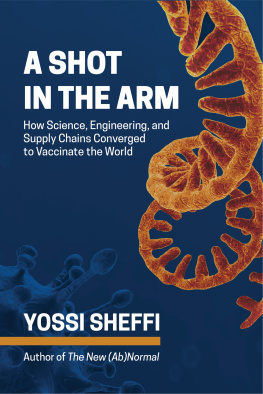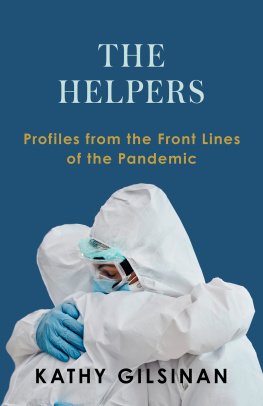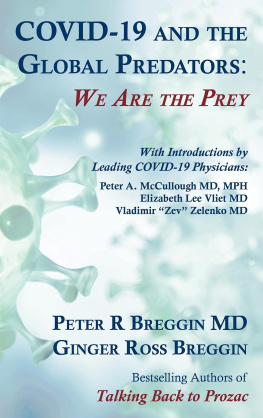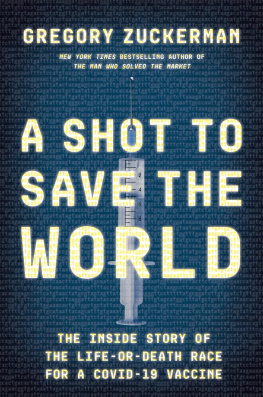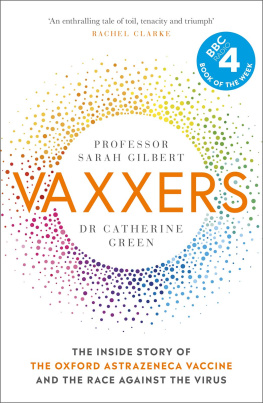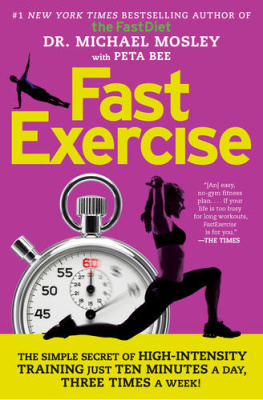The Messenger
The Messenger
Moderna, the Vaccine, and the Business Gamble That Changed the World
PETER LOFTUS
HARVARD BUSINESS REVIEW PRESS
BOSTON, MASSACHUSETTS
HBR Press Quantity Sales Discounts
Harvard Business Review Press titles are available at significant quantity discounts when purchased in bulk for client gifts, sales promotions, and premiums. Special editions, including books with corporate logos, customized covers, and letters from the company or CEO printed in the front matter, as well as excerpts of existing books, can also be created in large quantities for special needs.
For details and discount information for both print and ebook formats, contact .
Copyright 2022 Peter Loftus
All rights reserved
Printed in the United States of America
10 9 8 7 6 5 4 3 2 1
No part of this publication may be reproduced, stored in or introduced into a retrieval system, or transmitted, in any form, or by any means (electronic, mechanical, photocopying, recording, or otherwise), without the prior permission of the publisher. Requests for permission should be directed to , or mailed to Permissions, Harvard Business School Publishing, 60 Harvard Way, Boston, Massachusetts 02163.
The web addresses referenced in this book were live and correct at the time of the books publication but may be subject to change.
Library of Congress Cataloging-in-Publication Data
Names: Loftus, Peter (Peter D.), author.
Title: The messenger : Moderna, the vaccine, and the business gamble that changed the world / Peter Loftus.
Description: Boston, Massachusetts : Harvard Business Review Press, [2022] | Includes index.
Identifiers: LCCN 2022001931 (print) | LCCN 2022001932 (ebook) | ISBN 9781647823191 (hardcover) | ISBN 9781647823207 (epub)
Subjects: LCSH: Moderna (Firm)History. | Vaccines industryHistory. | Pharmaceutical biotechnology industryEconomic aspectsHistory. | Messenger RNA.
Classification: LCC HD9675.V334 M645 2022 (print) | LCC HD9675.V334 (ebook) | DDC 338.4/76153dc23/eng/20220210
LC record available at https://lccn.loc.gov/2022001931
LC ebook record available at https://lccn.loc.gov/2022001932
ISBN: 978-1-64782-319-1
eISBN: 978-1-64782-320-7
The paper used in this publication meets the requirements of the American National Standard for Permanence of Paper for Publications and Documents in Libraries and Archives Z39.48-1992.
For Eileen, James, Nora, and Luke,
with love and gratitude for
supporting me and each other through it all.
And for Mom, whose love and courage
have guided and inspired me.
Contents
Reporters Note
This book is based on nearly 300 interviews with more than 150 people. Interviewees include Moderna employees, cofounders, members of the companys board of directors and scientific advisory board, and investors, past and present. They also include people outside of Moderna who were involved in some way in the companys growth and in the Covid-19 vaccine project, as well as in the broader vaccine effort: US government health officials, government scientists, members of government vaccine advisory committees, executives and researchers at other drug companies, academic scientists, infectious disease doctors, vaccine specialists, clinical trial investigators and volunteers, and patent law experts.
Unless otherwise noted in an endnote or other attribution, the information conveyed here is from my own reporting. Many quotes in this book are verbatim from interviews or documents, or they are reconstructed dialogue based on the recollections of interview subjects. Some quotes and information are taken from other sources, including news articles by other reporters, which are cited.
The Messenger
Prologue
Disease X
IN EARLY JANUARY 2020, STPHANE BANCEL WAS VACATIONING near cool, dry Cannes, France, with his wife and two teenage daughters. For the forty-seven-year-old CEO of the biotechnology company Moderna, Inc., it was a much-needed break sandwiched between closing the books on a difficult 2019 and upcoming travel that he hoped would make 2020 a good year. First, hed jet to a health care conference in San Francisco to court investors, then cross the ocean to Davos in the Swiss Alps for the annual gathering of the global business elite.
Bancel was preparing to tell investors about the massive ramp-up of his company in Cambridge, Massachusetts, which had promised, for a decade now, to deliver an entirely new way of making drugs by harnessing the power of genetic information. He would tell them about Modernas new manufacturing plant outside Boston, its twenty experimental medicines in the pipeline, and its $1.3 billion in cash and investmentsmore than most biotechs without a product on the market, but nowhere near an average large pharmaceutical company, which spent many times that on marketing alone.
Bancel had a clear plan for 2020: get Moderna close to having a product by turning the genetic material, known as messenger RNA, into a vaccine. He wanted to reach new milestones in the byzantine development process all drugs go through.
Bancel knew that many investors probably wouldnt be wowed by this approach. Always dogging Moderna was that fact that no matter what Bancel said in his energetic pitches to raise money, no drug or vaccine using its gene-based technology had ever been approved for sale. Even Modernas most promising project, a vaccine against cytomegalovirus, was a couple of years away from coming to fruition. Even in biotech, where time-to-market is longer than most industries, investors patience could wear thin, especially for a ten-year-old startup. And their patience was reflected by Modernas stock, stuck under $20, a disappointing price that was lower than its initial public offering in late 2018.
Even on vacation, Bancels ritual was to wake up early and scan the news over a cup of tea while his family slept.
The Journal reported that health authorities in China were racing to identify what caused viral pneumonia in about five dozen people in Wuhan, in central China, and early lab tests were only showing what it wasnt: it wasnt a known flu strain, and it wasnt a known coronavirus that had caused scattered outbreaks before. It wasnt the SARS (severe acute respiratory syndrome), that caused an outbreak in China in 2003 and spread to other countries, killing hundreds before travel restrictions contained it.
Moderna was always looking for chances to prove its technology, and Bancel wondered if this mystery virus was a candidate for a vaccine that Moderna could try to develop. That morning, from France, he sent an email to Barney Graham, the deputy director of the Vaccine Research Center at the federal governments National Institute of Allergy and Infectious Diseases (NIAID) in Bethesda, Maryland, headed by Dr. Anthony Fauci.
Graham, then sixty-seven, was a central figure in the world of infectious diseases and the challenge of finding vaccines to combat them. He had an MD and a PhD in microbiology and immunology and helped run clinical trials of HIV vaccines at Vanderbilt before leaving in 2000 for his current post in Bethesda. The center was created initially to seek an AIDS vaccine but expanded its scope to focus on Ebola and the flu as well. Bancel knew Graham because NIAID and Moderna had collaborated on finding a vaccine for another virus that caused an outbreak, Zika. Although Zika abated and the vaccine efforts lost urgency, the collaboration continued, as Fauci saw promise in the messenger RNA (mRNA) technology Moderna was betting on.
Bancel had seen Barney Graham a few weeks earlier when Graham and his boss John Mascola visited Modernas new state-of-the-art manufacturing plant, in the shell of an old Polaroid film factory. Mascola recalled Moderna executives being proud of the plant, boasting that they could make a small batch of a new vaccine within sixty days of the medicines design.


